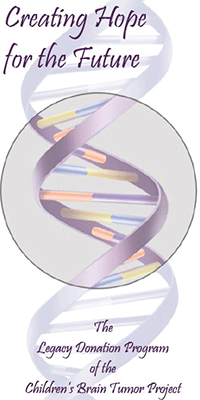
The diagnosis of an incurable brain tumor is an inconceivable challenge that no child or family should have to face. We at the Weill Cornell Pediatric Brain and Spine Center share your frustration and grief in receiving a diagnosis that has no cure. This impossible situation is the driving force behind the Children’s Brain Tumor Project. In the laboratory, in clinical trials and in vast data warehouses, we are working hard every day to achieve a single goal: bringing hope to the hundreds of patients and families each year who confront the heartbreaking diagnoses of rare and inoperable pediatric brain tumors.
The field of cancer biology is a rapidly evolving environment. These dynamic times have brought about a revolution in what we call precision medicine. That means that unraveling the cellular and molecular mechanisms of malignancies may lead to more effective patient-tailored therapies in the near future—drugs and treatments developed individually for a specific patient’s tumor. Financial investment in research is an important aspect of this goal, but tissue donation is equally vital in the path to changing the prognosis. The more samples we can study of each tumor and the more data we can collect and analyze, the better equipped we are to develop these personalized treatments.
Each donation allows us to gain a wealth of invaluable information through molecular, cellular and genetic analysis of the tissue. It is this information that is so essential to creating a brighter future for the children and families that this disease so greatly affects. The desperate need for tissue samples led us to create the Legacy Donation Program, which gathers samples in what is called a rapid autopsy.
We realize the decision to donate your child’s brain tissue from rapid autopsy is multifaceted and highly emotional, and requires reflection and preparation. We hope we can provide any information and guidance you may need in the process. Most important, we admire your strength in these difficult times. Together we will work toward changing the future of this devastating disease.
Sincerely,
Dr. Mark Souweidane and Dr. Jeffrey Greenfield
Co-directors, Weill Cornell Children’s Brain Tumor Project
Download the brochure about the Legacy Tissue Donation Program
Elements of the Legacy Donation Program
The Study: When a family makes a legacy donation, researchers are able to study a tumor in several different ways, including microscopic analysis and genomic sequencing. Each tumor can provide an astonishing amount of data, all of which can be invaluable to researchers.
The Analysis: Study of the tumor tissue generates a wealth of information about that specific tumor, but it also identifies patterns and commonalities with other tumors. This allows scientists to determine sub-groups of a tumor that may be vulnerable to known treatments, or lead them to developing new ones.
The Clinical Trials: Using the information gleaned from the tissue samples, researchers can conduct clinical trials to test new drugs, new delivery systems and other potential options for children diagnosed with a similar tumor.
The Goal: After thorough testing in the lab and in clinical trials, effective new treatments emerge for pediatric brain tumors, creating hope for families.
Frequently Asked Questions
What is a rapid autopsy?
A rapid autopsy is a way to procure tumor tissue quickly from both primary and metastatic sites (when applicable) before the tissue quality has degraded. Such rapid procurement improves the quality of advanced tumor analysis and permits an abundance of information to be extracted from tissue.
How soon after death is the autopsy performed? How long does it take?
The goal is to begin the autopsy procedure within two to three hours of death, but it can be considered for up to 12 hours after death. Once started, the procedure will typically take two to four hours to complete.
Where is the procedure performed?
The autopsy is performed in a state-of-the-art autopsy facility within Weill Cornell Medical College. The procedure will involve attending pathology faculty, pathology residents, experienced autopsy technicians and research tissue procurement personnel. If you do not live near our facility, we will help you coordinate this process with your local hospital, pathology department and funeral home.
Will the autopsy interfere with funeral arrangements or having an open casket?
No. A well-planned brain autopsy will not delay or interfere with a family’s funeral plans. You may have any sort of service or remembrance that you and your family wish. The autopsy is done discreetly and does not cause any change in the donor’s outward appearance.
When should plans be made to ensure tissue donation occurs in a timely way?
While it may be overwhelming and emotional, it is important to try to begin making plans for tissue donation as soon as possible. Ensuring that all details are coordinated prior to death will prevent stress during a very difficult time.
What if we register and later change our mind and do not wish to donate? What should we do?
You may withdraw from the donation program at any time. All you need to do is contact our office and inform us of your decision.
How do I find out more information legacy donation program?
Please contact our Neuro-oncology research team, which will help you with any questions and coordination.
Telephone: (212) 746-2363

